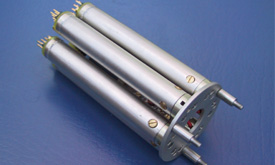One of the most intriguing open questions in particle and astrophysics is the nature of the missing mass of the Universe. Observing the rotation of galaxies, astronomers concluded that there has to be more than ten times as much mass than is visible as light-emitting stars. This puzzling discrepancy suggests the existence of some form of matter which is not emitting light and is therefore called dark matter.
Experiment
The CRESST II (Cryogenic Rare Event Search with Superconducting Thermometers) experiment searches for hypothetical massive elementary particles, named WIMPs (Weakly Interacting Massive Particles). WIMPs interact so weakly that they can easily penetrate even the earth. Experiments such as CRESST aim to detect the collisions of WIMPs with ordinary matter via their elastic scattering off nuclei. This is a challenging experimental problem, requiring very sensitive detectors and very good shielding to reduce backgrounds from local radioactivity and the cosmic ray background.
Location
To protect the detector from cosmic rays and other backgrounds, the experiment is being carried out in an underground laboratory deep within the Gran Sasso mountain group in Italy. The laboratory is located at 963m above sea level and 1400m of rock overburden shield the experiment efficiently from cosmic rays.

